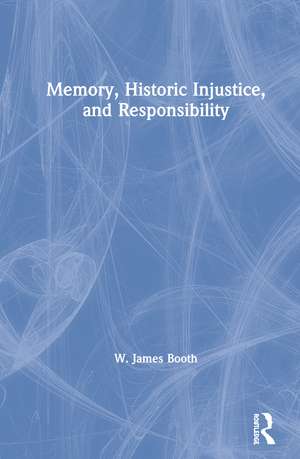Memory, Historic Injustice, and Responsibility
Autor W. James Boothen Limba Engleză Hardback – 30 oct 2019
Memory, Historic Injustice, and Responsibility is an insightful and original book on the relationship of past and present in thinking about what it means to do justice. A valuable addition to the currently available literature on historical justice, the volume will be of great interest to students and scholars of political science, philosophy, history, and law.
| Toate formatele și edițiile | Preț | Express |
|---|---|---|
| Paperback (1) | 294.60 lei 3-5 săpt. | +16.33 lei 6-10 zile |
| Taylor & Francis – 30 oct 2019 | 294.60 lei 3-5 săpt. | +16.33 lei 6-10 zile |
| Hardback (1) | 1000.27 lei 6-8 săpt. | |
| Taylor & Francis – 30 oct 2019 | 1000.27 lei 6-8 săpt. |
Preț: 1000.27 lei
Preț vechi: 1219.84 lei
-18% Nou
Puncte Express: 1500
Preț estimativ în valută:
191.41€ • 197.77$ • 159.23£
191.41€ • 197.77$ • 159.23£
Carte tipărită la comandă
Livrare economică 19 martie-02 aprilie
Preluare comenzi: 021 569.72.76
Specificații
ISBN-13: 9780367342210
ISBN-10: 0367342219
Pagini: 192
Ilustrații: 4
Dimensiuni: 152 x 229 x 18 mm
Greutate: 0.45 kg
Ediția:1
Editura: Taylor & Francis
Colecția Routledge
Locul publicării:Oxford, United Kingdom
ISBN-10: 0367342219
Pagini: 192
Ilustrații: 4
Dimensiuni: 152 x 229 x 18 mm
Greutate: 0.45 kg
Ediția:1
Editura: Taylor & Francis
Colecția Routledge
Locul publicării:Oxford, United Kingdom
Public țintă
Postgraduate and UndergraduateCuprins
1. Introduction. An archipelago of absence 2. Justice between Past and Present 3. Is the past a foreign country? 4. Doing justice to the dead 5. Conclusion
Recenzii
"Is there such a thing as an intergenerational "community of justice"? Do we owe solidarity to the dead? Are we morally obliged not to fall into a state of historical amnesia? These are philosophical questions of enormous scope and significance, and James Booth, with his formidable learning, intellectual clarity, and capacious insight, is uniquely well-equipped to do them full justice. This task is even more urgent in a time when certain European governments (in Poland, for instance) have tried to legislate away their responsibility to the past." — Ronald Beiner, Professor of Political Science, University of Toronto
"James Booth has given himself a very challenging task: to rationally justify the belief that we have obligations of justice owed to dead victims themselves, not merely to current and future persons who are linked in various ways to them. Drawing on classic Greek and contemporary literary works, he provides a powerful and deeply moving account that argues the dead are gone only in an embodied sense: they remain part of an enduring community all of whose members - past, present, and future - are entitled to just treatment." — Jeffrey Blustein, Professor of Philosophy, City College of New York
"James Booth has given himself a very challenging task: to rationally justify the belief that we have obligations of justice owed to dead victims themselves, not merely to current and future persons who are linked in various ways to them. Drawing on classic Greek and contemporary literary works, he provides a powerful and deeply moving account that argues the dead are gone only in an embodied sense: they remain part of an enduring community all of whose members - past, present, and future - are entitled to just treatment." — Jeffrey Blustein, Professor of Philosophy, City College of New York
Notă biografică
W. James Booth is Professor of Political Science and Professor of Philosophy at Vanderbilt University. His current research is focused on memory, identity and justice. Before coming to Vanderbilt, Booth was on the faculties of McGill University and Duke University. At Vanderbilt, Booth teaches courses in the history of political thought, religion and politics, and graduate and undergraduate seminars on topics in contemporary theory.
Descriere
Grounded in political theory and guided by the literature on historical justice, Memory, Historic Injustice, and Responsibility restores the dead to their central place at the heart of our understanding of why and how to deal with past injustice.
